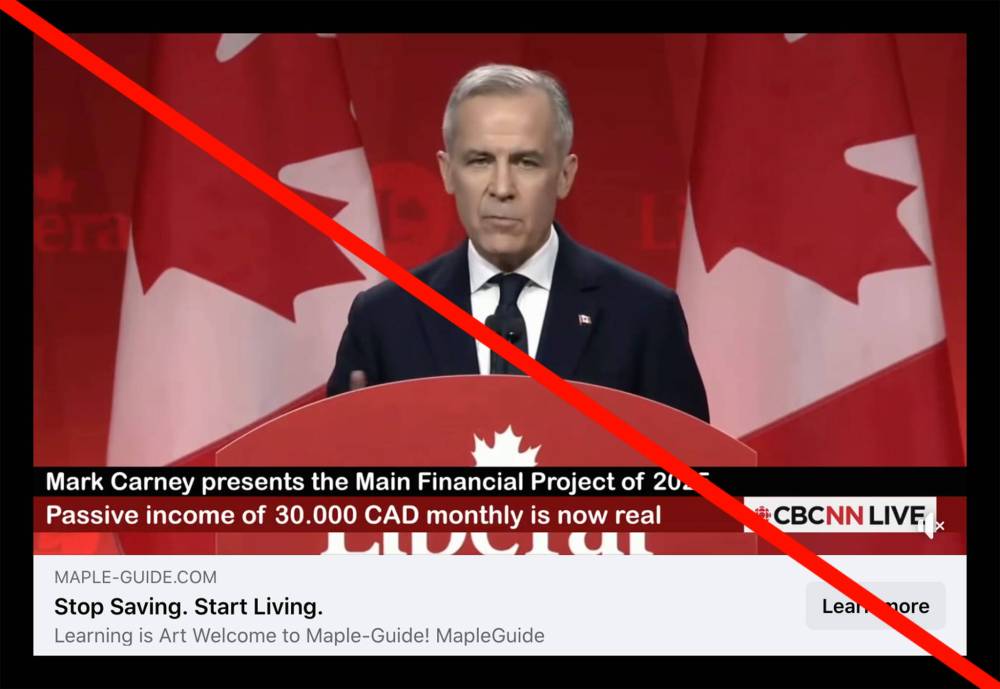Facebook Ads and the Erosion of Democracy: A Deep Dive into the Dangers of Disinformation
In the ever-evolving landscape of digital communication, Facebook ads emerge as a powerful tool, but when misused, they pose a significant threat to our democratic processes. The alarming rise of disinformation campaigns, particularly during election cycles, reveals how this platform can be exploited to undermine trust and manipulate public perception.
The Rise of Deepfake Technology in Political Advertising
The Problem at Hand
Recently, a deepfake video surfaced, showcasing a figure resembling Liberal leader Mark Carney addressing a crowd, with Canadian flags adorning the backdrop. Styled to mimic a press conference from CBC News, the video featured a news ticker proclaiming "Mark Carney presents the Main Financial Project of 2025." However, this attempt at authenticity was nothing more than a sophisticated fraud, promoting a passive income scam that promised viewers the opportunity to earn a staggering $1,000 a day without any investment or expertise.
Can anyone truly believe such claims? The illusion is compelling — and that’s the problem. This isn’t just a harmless hoax; it’s a calculated attempt to mislead.
Public Reaction to Misinformation
What’s staggering is the reaction of many Facebook users who engage with this deceptive content. Comments range from accusatory: "A liar and a thief," to zealous political endorsements: "Vote Conservative! ONLY!" This engagement illustrates a troubling truth — a significant portion of the public remains unaware of the artificial nature of the content they’re consuming.

An AI deepfake video purporting to show Prime Minister Mark Carney (Facebook)
Understanding Disinformation Campaigns
The Role of Generative AI
Disinformation is not a novel problem; what’s troubling now is the introduction of generative AI technology in its execution. According to Jennie Phillips, director of the Project on Information Ecosystem Resilience, the sophistication of these AI-generated videos has drastically evolved, posing a unique challenge in modern electoral politics.

Jennie Phillips is the director of the Project on Information Ecosystem Resilience with the Media Ecosystem Observatory. (Supplied)
The Ecosystem of Misinformation
The Canadian Digital Media Research Network has identified over 75 Facebook pages that masquerade as legitimate news outlets, promoting links to cryptocurrency scams throughout the 2025 election campaign. Some posts have attracted upwards of 2,400 reactions and 500 comments.
Phillips emphasizes the need for vigilance in a digital landscape where fake news thrives, especially when it garners both serious and derisive engagement.
The Propagation of Fake Content
Fake content is not confined to Facebook. According to Phillips, platforms like X and TikTok also host fake avatars and divisive narratives aimed at voters. Deepfakes of politicians, some alarmingly malevolent—like those suggesting Carney has devilish affiliations—further erode public trust.
"The more raunchy or disturbing, the more viral the content becomes,” Phillips notes. Disturbingly, the simplicity of creating deepfakes now means anyone with a smartphone can generate misleading content, raising the specter of disinformation becoming even more pervasive.
The Societal Impact of Disinformation
A Fragmented Information Space
Jason Hannan, a professor at the University of Winnipeg, further explores how disinformation thrives within the fragmented discursive arena of social media. He draws parallels to Neil Postman’s critiques of television media, positing that social media has only intensified the degradation of public discourse.
Hannan argues that entertainment has overshadowed argument, leading to a political environment where superficiality often prevails over substance. “The louder and sillier the speech, the more likely it is to succeed,” he warns.

University of Winnipeg professor Jason Hannan.
The Role of Media Literacy
Building an Informed Citizenry
The disheartening truth is that a large segment of the Canadian population lacks the critical skills necessary to parse fact from fiction online. This reality sets the stage for disinformation to thrive, particularly when users already grapple with feelings of disenfranchisement or social isolation.
Phillips stresses the urgency of enhancing media literacy and critical thinking among the electorate to safeguard democracy. The responsibility lies with each citizen to identify misleading content, report it, and foster healthier information ecosystems.
The Future of Journalism in a Digital Era
The decline of quality journalism is alarming. With news organizations facing significant budget cuts, fewer resources are available to investigate and counteract the rise of deceptive content. In an era where platforms like Meta have blocked news access for Canadians, the void left by discredited journalism could lead to an even deeper crisis of democracy.
"Without reliable journalism, the electorate risks being uninformed, or worse, disinformed," Hannan argues, emphasizing that informed citizens are essential for a flourishing democracy.
Conclusion: The Path to Awareness and Responsibility
As Canadians engage with social media platforms, it is imperative to remember that the digital space is rife with potentially harmful content. Awareness and proactive measures are our best tools against disinformation. By diversifying news sources and critically evaluating the information we encounter, we can combat this virtual virus of misinformation.
The stakes couldn’t be higher; as these platforms become integral to our democratic processes, protecting the integrity of our information landscape is imperative. Remember: an informed citizenry is the backbone of democracy.
Let us work together to ensure our democracy remains healthy and strong, ultimately safeguarding it against the pernicious threats of disinformation.






